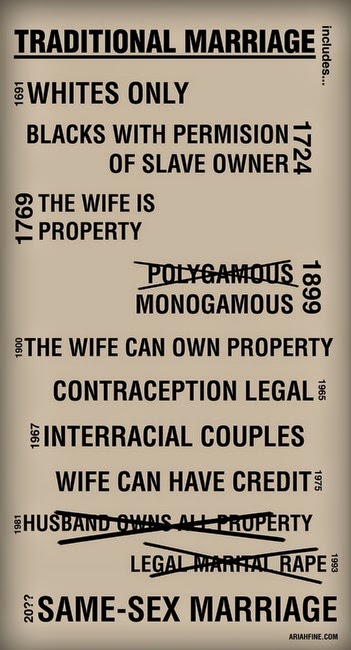Human Sexuality and Sin,
Part 1
And Jesus said to them, “Because of your hardness of heart he wrote you this commandment [regarding divorce]. But from the beginning of creation, ‘God made them male and female.’ Therefore a man shall leave his father and mother and hold fast to his wife, and the two shall become one flesh.’ So they are no longer two but one flesh. What therefore God has joined together, let not man separate” (Mark 10:5-9).
My parish is hosting a presentation by a speaker from the Christian, pro-family organization Focus on the Family tomorrow (March 28, 2018). There has been a bit of controversy within the community over this. It manifested when the Chamber of Commerce removed from its Facebook page an advertisement promoting the presentation, after receiving some complaints from local community activists. Focus on the Family has an “anti-LGBTQ agenda” and activists are outraged that a member of the community would give voice to such a bigoted organization. In light of this, I thought it would be good to talk a little bit about how Christianity understands human sexuality and sin.
Fellow Christians, I hate to admit it, but Jesus never said the word, “Homosexual.” He never explicitly said anywhere in the New Testament, “Don’t go around having sexual intercourse with other people who are the same sex as you.” Before we go all #LoveWins, painting our LCMS church buildings in rainbow colors, and ordaining transgender pastors, however, perhaps we should give this some more thought. Just because the word “homosexual” wasn’t uttered by Jesus, doesn’t mean that he condones homosexuality. If that were the proper method for interpreting the Scriptures, we could do away with the doctrine of the Trinity, as that word is also nowhere to be found in the pages of the Bible.[1]
When asked by the Pharisees about divorce, Jesus appeals to the beginning of creation. He points out to them that, “God made them male and female,” a fact which was obvious to his audience. It is the natural created order. Or, if you are a Darwinian Naturalist, it is the natural law produced through millions of years of evolution. In this passage, Jesus defines what marriage is, and his definition makes it clear that gender is essential to it. He doesn’t have to continue on and say, “But God did not make them male and male; neither did He make them female and female, nor male and female and female, or…” All other combinations are excluded by the example which Jesus gives.
But Jesus can’t mean that marriage is supposed to be exclusively between one man and one woman, because the Bible is full of polygamy, adultery, and all other manner of what up-tight confessional Lutheran types call “sin.” Yes, the Bible does record many instances of polygamy. The Bible also records many murders, thefts, and other felonies, but this does not mean that God is giving mankind Carte Blanche to commit these acts. The Bible records that Cain murdered Abel, yet we don’t call for the legalization of murder because it’s “in the Bible”. The Bible records David’s adultery with Bathsheba, yet we do not claim that it is sanctioning such behavior by us in the present day. The Bible isn’t even sanctioning such behavior by the people about whom it reports. God specifically judges the actions of David, Solomon, and many others by commanding, “You shall not murder,” and “You shall not commit adultery.”
Likewise, the Bible records at least one instance of homosexual behavior in the story of Lot and the destruction of Sodom and Gomorrah. Genesis 18 and 19 recounts the destruction of Sodom because of its wickedness: Then the LORD said, “Because the outcry against Sodom and Gomorrah is great and their sin is very grave, I will go down to see whether they have done altogether according to the outcry that has come to me. And if not, I will know.”[2] What was the sin of Sodom? Homosexual desire.[3]
Those passages about Sodom and Gomorrah are from the Old Testament though! They don’t apply. This isn’t exactly true. Jesus Christ is Immanuel, God, with us; He is God incarnate. He is the image of the invisible God, by whom all things were created.[4] Jesus is the very God who created and sustains the world.[5] He told the Jews this and, when they heard him assert that he was the great I AM who told Moses his name through the burning bush, the God who spoke to Abraham, they were ready to stone him for blasphemy.[6] The Jesus speaking to the Pharisees in Mark 10:7 is the same person speaking the words recorded in Genesis two. That also makes him the God who commanded what is recorded in Leviticus 20: If a man lies with a male as with a woman, both of them have committed an abomination; they shall surely be put to death; their blood is upon them.[7]
While Jesus in the Gospels does not use the word homosexual, the Apostle Paul does. St. Paul explicitly states that men who practice homosexuality with not inherit the kingdom of God.[8] Here St. Paul records a list of sinful behaviors, including homosexuality. His list is comprehensive; it includes every person. It’s like a buffet of sinfulness; everyone can find something that they like. St. Paul continues, however, reminding the Corinthians that, despite having once been sexually immoral, idolaters, adulterers, homosexuals, thieves, etc., they have been redeemed by Christ. St. Paul also takes Jesus’ thread from Mark 10:7 regarding the one-flesh union and explains it further, calling the Corinthians – and us today – to repent of our sins, flee from sexual immorality of all kinds, and glorify God in our bodies.[9]
It is clear, even to someone who is not a Christian, that the male body was not designed (either by God, or Nature, if you please) to mate with another male body; likewise with two female bodies. The fact that people crave such relationships proves that something has gone terribly wrong with creation.[10] That thing is sin, and no human being since The Fall has been immune to it.[11] We have all been utterly corrupted by sin from the time of our conception.[12] We are, by virtue of our utterly corrupt nature, objects of God’s wrath.[13] Man’s natural mind will not, and cannot, accept the things of God.[14] That corruption may not manifest itself as a desire to have sex with people of the same gender in some, but it does in many. Furthermore, those who do not struggle with homosexual desire most certainly struggle with something else. We are all in the same boat when it comes to sin, and our complete inability to overcome it.
The problem is that liberal Bible scholars and progressive social activists don’t believe that Jesus is God. They don’t believe that the Bible is the divinely inspired, inerrant Word of God. They don’t believe that St. Paul is an Apostle. They believe in moral relativism because that gratifies the desires of their flesh. They believe in the idea that every person has their own individual truth. Rather than freedom of religion and freedom of speech, they believe in the freedom of being protected from speech they find offensive. Nothing, short of God changing their hearts through the message of Christ, will change their darkened minds.[15] As Christians, we are called to abhor sin, and to flee from it. This also includes the sin of homosexuality. We must also remember that Christ shed his blood and died for all men. Christ took the sin of the homosexual, the idolater, the adulterer, the thief, the hypocrite, the murderer, the liar, onto himself, and atoned for that sin with His own blood, shed on the cross. A homosexual, like any other sinner, needs to hear God’s word of Law and Gospel applied to their life with the goal of repentance and faith.[16]
[1] If only progressive social activists would apply the same standard of interpretation to the US Constitution. That, however, is an article for another day.
[2] Genesis 18:20-21
[3] Genesis 19:4-5
[4] Colossians 1:15-20
[5] Hebrews 1:1-3
[6] John 8:48:59
[7] Leviticus 20:13
[8] 1 Corinthians 6:9-11
[9] 1 Corinthians 6:12-20
[10] Engelbrecht, Rev. Edward A., ed. The Lutheran Study Bible. Saint Louis: Concordia Publishing House, 2009.
[11] Genesis 3
[12] Psalm 51:5
[13] Ephesians 2:3-5
[14] 1 Corinthians 1:18; 2:14
[15] Romans 10:17
[16] Engelbrecht, Rev. Edward A., ed. The Lutheran Study Bible. Saint Louis: Concordia Publishing House, 2009.




